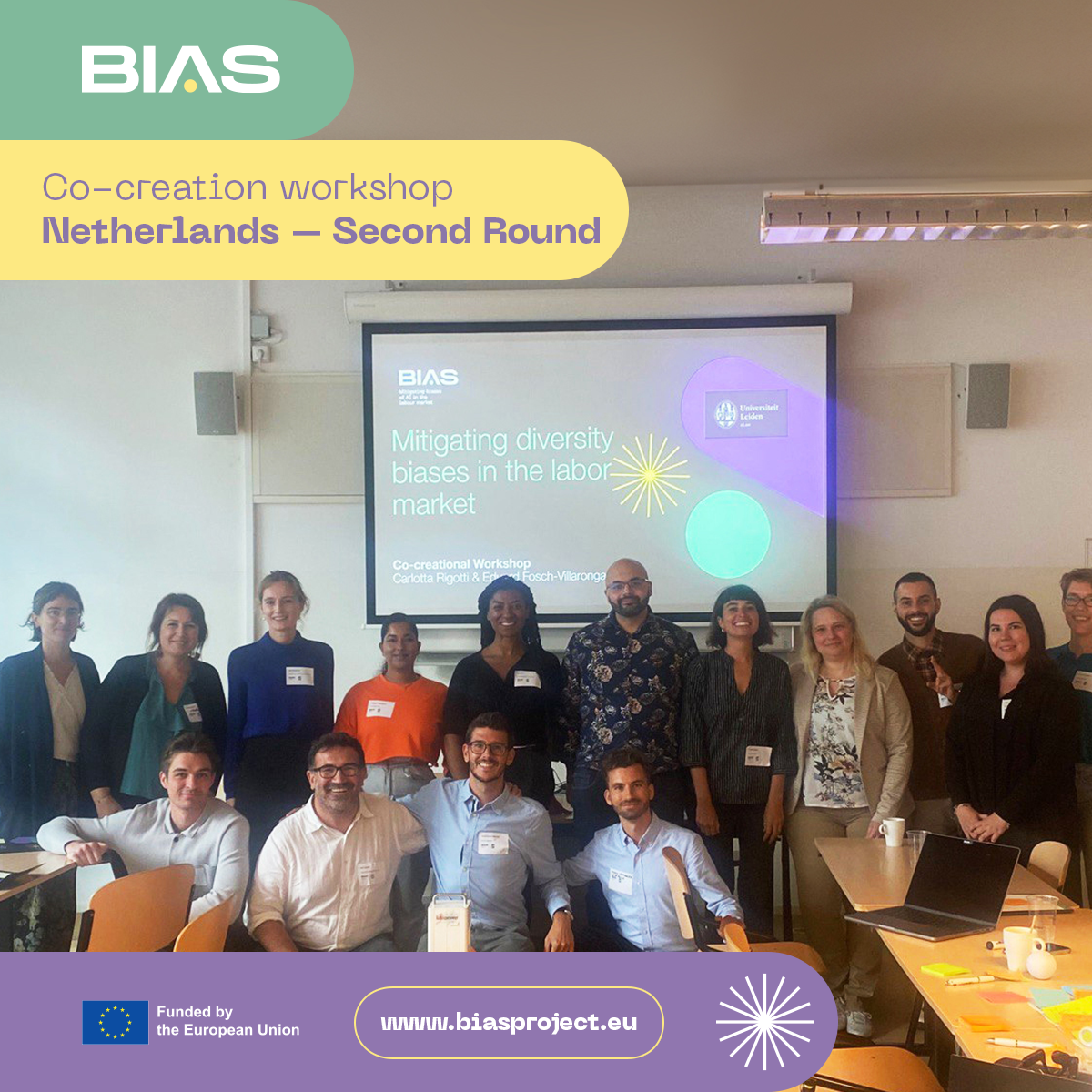27th October 2023
The stage was set on the 30th of August 2023 for the second co-creation workshop of the BIAS project at Leiden University. A diverse crowd of high-level experts, ranging from HR practitioners, AI developers, researchers, civil society representatives, and workers, gathered with a shared purpose: To engage in a dynamic discourse on fairness in the hiring process. Central to this dialogue was the envisioning of the Debiaser, a groundbreaking and trustworthy technology designed by the BIAS project to redefine the landscape of recruitment and selection and the most desirable features of the Debiaser, namely an innovation and trustworthy technology that the BIAS project plans to design for recruitment and selection. Carlotta Rigotti and Eduard Fosch-Villaronga led the workshop, assisted by the invaluable contributions of Alexa Zainea and Raiz Shaffique.
As the co-creation workshop unfolded, participants engaged in thought-provoking discussions that unraveled key insights into the labyrinth of fairness in recruitment and selection. The majority of votes strongly favored non-discrimination as the most crucial requirement for ensuring fairness. It emerged as the bedrock principle, the cornerstone upon which fairness in hiring could be built. Yet, this consensus was not unaccompanied by a nuanced perspective. Participants, in their collective wisdom, posited that fairness should be perceived as a mosaic, namely a puzzle intricately composed of diverse pieces. In this regard, another notable fragment surfaced in the discourse: Diversity. Participants underscored the importance of acknowledging and embracing diversity to foster inclusive and representative workforce, especially for the creativity and adaptability it brings about. Overall, it was a recognition that fairness transcends a singular dimension and requires a holistic approach, incorporating varied facets for a truly equitable hiring process.
Following a brief plenary session – and a well-deserved coffee-break, the workshop then transitioned into a more practical phase. Participants assumed the roles of HR practitioners and AI developers, collectively crafting the blueprint for the Debiaser. Imagination took flight as they endeavored to envision an optimal design for this technology, equipped with modules proficient in identifying and mitigating diversity bias. The conversation particularly focused on the role of AI applications in recruitment and selection. Beyond the conventional aim of enhancing efficiency in terms of time and resource utilization, participants proposed a more expansive role for AI. They envisioned AI not merely as a tool but as a knowledge partner for HR practitioners. The suggestion resonated with the notion that AI applications could assist in filling knowledge gaps, while acting as a double-check mechanism for certain CV information. This broader perspective on AI’s role matches the changing recruitment and selection landscape, where technology is more of a partner in enhancing human abilities than just a process facilitator.
As the day progressed, a palpable sense of curiosity and anticipation filled the air, casting a hopeful gaze towards the future of the BIAS project. Participants didn’t merely leave as contributors of expertise. Rather, they emerged as active collaborators, essential to a transformative journey that unfolded within the workshop’s confines. Sporting smiles that mirrored shared accomplishment, they exited the space, leaving behind the promise of a future where AI in recruitment stands as a beacon of fairness and diversity. This commitment to a more equitable future lingered, much like the convivial atmosphere of the post-workshop borrel, that is to say, an informal Dutch social gathering marked by drinks and fried snacks. The close-knit bonds formed during the event echoed a shared vision for a world that embraces both technological advancement and inclusivity. This highlighted the collaborative spirit that will propel the BIAS project towards its impactful destination.
